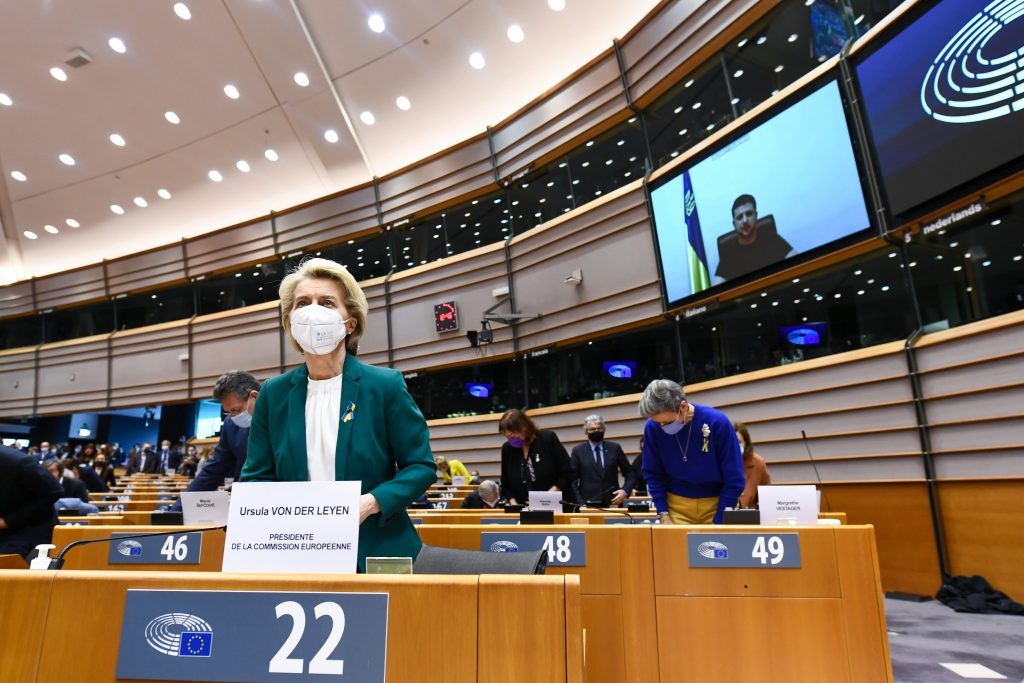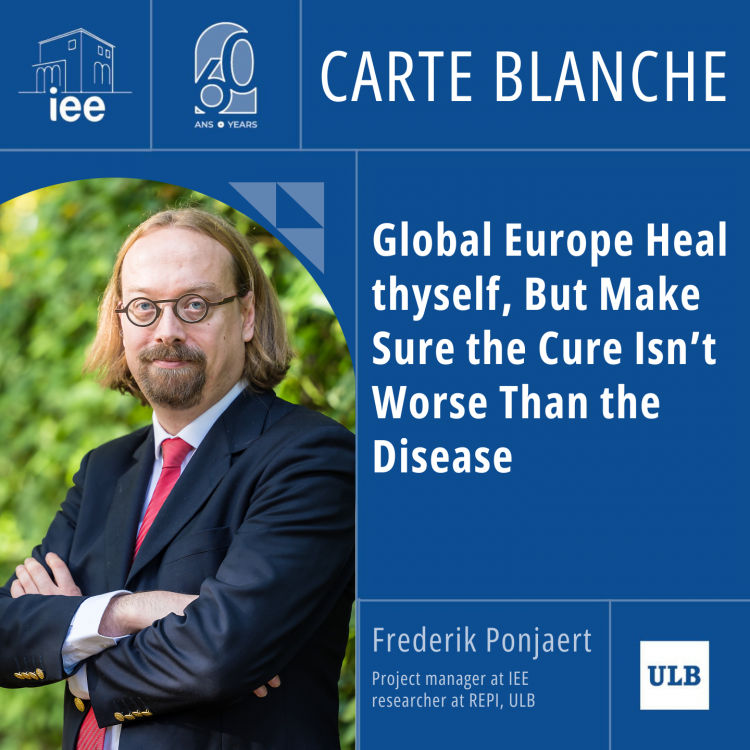 Bruno de Sousa is a student in Political science and International Relations and member de Eyes on Europe.
Bruno de Sousa is a student in Political science and International Relations and member de Eyes on Europe.
Created in 2004, Eyes on Europe is an association of students from the IEE and the ULB. Its objective is to offer a new vision of European news to the student community by creating quality content, with as main activities the publication of a bilingual (French-English) bi-annual magazine and weekly online articles focusing on European issues
Albeit much of the criticism to the European Union rests within its internal and structural organization, there is one major critique that escapes this norm, and that has been growing in the public eye for some time: its lack of a coherent external security policy. In the last decades, several international crises took place around the EU’s bordering zones: the Yugoslavia wars during the 90’s, the Russian invasion of Georgia in 2008, the Syrian war and the consequent refugee crisis in 2015, Russia’s annexation of Crimea in 2014, Belarus’ violations of human rights during the 2020-2021 protests, and now Putin’s invasion of Ukraine. Despite comprising some of the most influential and economically powerful countries in the world, such as France and Germany, the EU has been unsuccessful to change the course of action set by some of its neighbouring authoritarian regimes. In the light of the recent events, it is thus important to understand which mechanisms – or lack thereof – the EU possesses in order to ensure its strategic independence and its influence on neighbouring areas.
Why does having an effective EU strategic force matter
Of all the policies that the EU has been developing in the last years – environmental, space and economic-related – one can say that, when it comes to security and defence, the Union is walking on thin ice by balancing the adaptation to current challenges with the need to appease Eurosceptics by not going too fast towards a federalization. Nevertheless, the EU has been increasingly using soft power strategies in its external relations, particularly with its neighbours. This means that, in order to obtain its objectives, its strategy is defined through the non-use of direct force, taking as an alternative its economic leeway to entice other players to abide by the EU’s aims, with the purpose of achieving win-win scenarios. Yet, even a soft power actor needs a muscular strategical apparatus behind its lines of action to support these plans. This is so because relations are formulated on the basis of power perception: how A is positioned in relation to B will depend on how A sees B, and on how A thinks that it is seen by B.
As a practical example, this is why our behaviour is different when we are around a close friend than when we are speaking with the headmaster of a University. The speech and the posture that we use is not the same because we do not perceive the headmaster in the same way as our close friend. The equivalent happens in the international relations between States, with the way a certain country is perceived by others depending on several factors: its population, economy, history and having (or at least, having the capacity to have) a military force.
Let’s take the Cold War as an example. The United States and the Soviet Union were never involved in a direct war among each other, fighting only through proxy wars across several geographical scenarios. Yet, even without using their military forces directly, it was the fact that they had a giant apparatus composed of intelligence services, technology, military personnel and nuclear armament that led to mutual respect and compromise between the two parts. An offensive coming from either side would result in a loss scenario for both: the outcome would not justify the conflict, since even if a side “won the war”, the price would just be too high. In other words, it is by having de facto military power that an international actor can successfully evade any potential threats and ensure that other states will sit at the negotiation table to make compromises, instead of opting for conflicts to achieve their goals.
Regarding the concept of power and military force there are two key ideas to keep in mind: first, the power of a country or alliance is not defined merely by its military power. Other aspects, such as economic power and diplomatic coalitions play an important role, both in hard and soft power strategies. Secondly, it is important to establish that, in the same way economics are made up of several sub-factors (such as exportations/importations, purchasing power, national debt, GDP, etc..) the defence and security policies do not only encompass military forces, but as well intelligence services, counter-espionage, military industrial complexes, and so on.
If we look to the Russian invasion of Georgia in 2008, we can deduce that due to Georgia’s small population, its non-relevant economic power to influence its aggressor, and its lack of a strong military complex, the Russian army was able to just roll over into its borders without taking into consideration Georgia’s political will. Thereby, it can be concluded that countries that do not have alliances or economic power to maintain an effective and modern military force are at the lower end of the international “food chain”.
The current challenges of a more cohesive EU security and defence policy
Even though there has been a certain popular support for a more coordinated strategic effort, for several reasons the EU seems to be taking shy steps forward under a low-key profile. The first motive relies on the rise of eurosceptic movements, which defend solely a practical economic union between European countries and believe that the EU already went too far in the “union aspect”. Having an effective military force would be seen by these groups as the nail in the coffin of states’ sovereignty, and would speed up the formation of a European federation.
Secondly, some popular anti-war movements defend that countries, including the EU itself, should not pursue a ramp up of military expenditures. Moreover, some Member States themselves support this idea. Countries such as Austria, Finland, Ireland and Sweden are not even currently in NATO, wishing to maintain a “neutral” status, with most of their population not supporting a potential European defence force.
Additionally, due to the important nature of these decisions, it would be necessary to have the unanimous consent of the 27 member states, something that experience has proven to be quite hard. As an alternative scenario, the initiative could start with a small group of EU countries, just like the monetary union or the Schengen area.
Furthermore, because European countries are not on the same level playing field, bigger and powerful member states could push to have a privileged opinion in the decision making process, since countries like Croatia, Slovenia or Greece do not have the same military might as France, Germany, Italy or Spain. One can wonder if a state like France, which currently possesses one of the best armies in Europe, would give up its advantaged position for a common European cause. But on the opposite side, if bigger countries have a stronger say in EU defence and security affairs, could a common defence project really be described as European or would it just be a sphere of influence of France and Germany? In order for it to be truly European, it would be necessary to balance the decision-making process between all the member states under a framework EU chain of command, which would deliver a more effective and efficient response to any adversities that may arise.
The role of NATO
It is no surprise that the defence of the European continent currently relies on the North Atlantic Treaty Organisation (NATO), a military defence pact that involves most European countries plus the United States. The drawback of this organisation lies in the fact that the US holds a privileged position in the higher chain of command, due to its bigger and more modern army and to its major financial contributions (with around 3.42% of its GDP versus, for example, Belgium’s 0.93%). The other problem is that, although the defence of the continent is one of its primary objectives, the organisation has been creating a track record of illegal offensive operations, such as the illegal invasion of Iraq and the bombing of Belgrade. Many European countries did not have the political will to partake in such military quests (such as France and Germany in the case of Iraq), yet nevertheless they went through in order to uphold the integrity of the Alliance.
Additionally, several American presidential elections have shown that the reliability of the Alliance has its weak points. This is because NATO’s cohesion is much dependent on the US’ participation, which in turn is subjected to the will of its head of State. An American president questioning the US’ economic expenses on NATO and its role in modern times is all it would take to destabilize the unity and cooperation of the organization. Even with the current US administration’s efforts to restore its image of a stable ally, the scars left by Trump’s period in office will always serve as a reminder to European leaders of how the stability of the alliance can change overnight.
Ukraine under attack: the turning point in the EU’s power constraint?
Soft power initiatives, such as the Eastern Partnership (EP) – a project that aims to regulate the political and economic relations between the EU and ex-Soviet States – have failed terribly. Most of the countries covered by this initiative have been invaded (in the case of Georgia and Ukraine), entered in a conflict (Armenia and Azerbaijan) or are under a dictatorial regime (Belarus). The EU’s goal was to exercise its influence exclusively through economic means, without coercive force to back up its actions, in order to liberalize these countries’ economies and to bring them together under the EU radar. As it is observable, this resulted in national sovereignty and human rights being violated by Russia – traditionally known for its use of hard power policies – across these EU’s neighbouring countries. This European doctrine of military restraint and high tolerance for authoritarian regimes has thrived with the end of the Cold War and the consequent disintegration of the USSR in 1991. Several European countries drastically reduced their military expenses, bearing in mind the horrors of both world wars, the division of the continent and the constant fear of the breakout of a war between East and West. With the fall of the Berlin wall, this idealist approach gained attraction, setting up a mindset that Europe had finally met the last days of military tensions. Then, the Russian invasion of Georgia took place in 2008, a red flag that many European leaders turned a blind eye to, maintaining close economic ties with Russia even after that. Later, the annexation of the Crimea took place in 2014 with many European politicians once again thinking everything would stop there. In fact, Angela Merkel’s government even gave green light for the permit of construction and operation of the Nord Stream II just a few years later, in 2018, ignoring the geopolitical risks of being so dependent on essential raw materials, such as natural gas and oil, coming from authoritarian regimes.
Irrevocably, with the Russian invasion of Ukraine in February 2022, many saw the unthinkable becoming a reality: a nuclear-weapon state invading a sovereign European nation, risking escalating the conflict to levels never witnessed before. A backlash from the West erupted swiftly: several heads of state expressed their condemnation of the Russian invasion: Finland and Sweden, two historically neutral states, started to consider joining NATO; Switzerland, also known for its neutrality, condemned as well the invasion; and Germany, which had adopted a doctrine of non-military development during the last 30 years, is starting to gear up its military power for the first time since the end of the Cold War. The public opinion inside Russia plummeted, while several brands and companies removed their products and services from the country. Even the vigilante group Anonymous declared a virtual war against Russia, and several unprecedented economic sanctions were unleashed from countries all over the world.
The Russian invasion shows that peace in Europe cannot be taken for granted . Many refused to believe it even with several warnings coming from the US intelligence services in the weeks prior to the invasion, thinking it was a US campaign of fear and ostracization of Russia. This mindset is the result of several decades of taking peace for granted, assuming that not even Russia would dare to invade another country. Yet, paradoxically, the Russian invasion advanced the spirit of European unity faster than any European policy or political figure could. Perhaps Putin’s regime thought that Brexit, the Poland and Hungary rift with the EU, the refugee crisis and the following waves of nationalism were signs of European fragmentation, but instead his actions brought the EU countries back together just like the British Empire did to the United States and the Mongols to China: “a common danger unites even the bitterest foes”.
A change of doctrine: Is Europe getting closer to its strategic autonomy?
While political projects of a more united Europe under a framework of defence remain still just “drafts in the desk drawer”, recent events seem to have hastened the general mood for further defence cooperation in the EU. Nevertheless, EU leaders should not ask themselves “does the EU need to coordinate its defence and security policies?” but instead “do Europeans wish for a more united European force?”. Would a French soldier be willing to fight for a country like Greece, the same way a Californian would if Florida is attacked? It seems clear that, before such projects materialize, a genuine feeling of “being European” must exist beforehand. For that it is necessary to continue putting forward that in the diversity of European cultures there is strength, maybe through small, but nevertheless thoughtful steps. Nonetheless, the EU seems to be realizing that a change of doctrine is necessary to take on current challenges. As the Romans already used to say: “Igitur qui desiderat pacem, praeparet bellum”, or those who wish for peace, prepare for war. Not in a sense that war is inevitable or that we should recur to it, but in the sense that it is because such force exists that it dissuades any potential external threat from even considering worthwhile to initiate an invasion or, as some would call it, a “special military operation”.
The Institut d’études européennes is not responsible for the views expressed in this article
This article was originally published by the student magazine Eyes on Europe. To discover their full content
Photo credit: Photographer: Dati Bendo
European Union, 2022
Copyright Source: EC – Audiovisual Service




